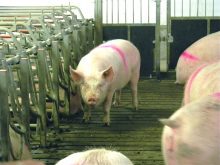Should Manitoba become an organic province? A farmer complaining about tight pesticide restrictions mused about how this could be coming. While he was speaking in jest, he might find support for the move.
At the Organic Producers Association of Manitoba (OPAM) fall seminar here Nov. 15, provincial organic specialist John Hollinger announced a small program to encourage farmers to consider transitioning to organic farming to meet the growing demand for products.
There is more demand than supply, he said.
Andy Hammermeister, manager for the Organic Agriculture Centre of Canada, said large processors have been saying there is an inadequate supply to permit large-scale processing of most fruits and vegetables.
Read Also

Mazergroup’s Bob Mazer dies
Mazergroup’s Bob Mazer, who helped grow his family’s company into a string of farm equipment dealerships and the main dealer for New Holland machinery in Saskatchewan and Manitoba, died July 6 from cancer.
“Nature’s Path, the largest organic cereal company in the world is expressing concerns about shortages in Canadian grains and other ingredients,” he said.
But local farmers’ markets do very well and offer an adequate supply of organic fruits and vegetables.
For institutions such as schools and health-care facilities, he said, there doesn’t seem to be a large enough supply to make it worthwhile to change purchasing habits. But if more consumers demand organic product, the demand could go up.
Talk of changing an entire province to organic has already been whispered, according to Hammermeister; Prince Edward Island was under consideration. The problem with switching an entire province, even one as small as P. E. I., is that supply would outstrip demand immediately.
In P. E. I, there is a focus on value-added products rather than a straight commodity. Organic products are a perceived value-added product – but Hammermeister said if enough are produced, they could quickly become commodities and that would be bad news for organic farmers.
“They will always have much more price control if they are value-adding to ensure they are not trading as a commodity,” he said.
New national standards will help eliminate ambiguities in criteria between provinces. They should be in place by June 2009.
Research, done mostly in the U. S. and Europe, increasingly shows organic farming has environmental benefits.
“For example, organic uses significantly less energy, mainly because fertilizers are so energy intensive,” said Hammermeister.
Organics expert and agronomy professor, Martin Entz of the University of Manitoba said the ideal system for some areas may actually be a compromise between organic and conventional.
But he doesn’t see the province going organic.


















